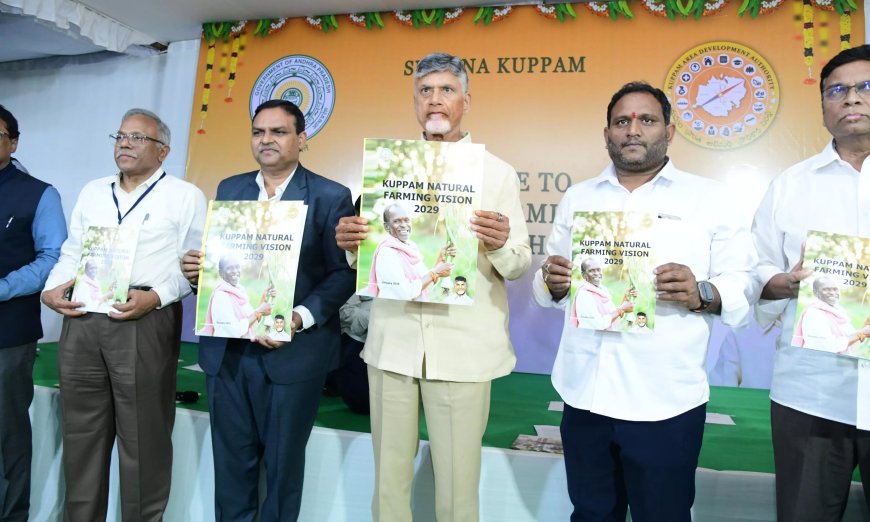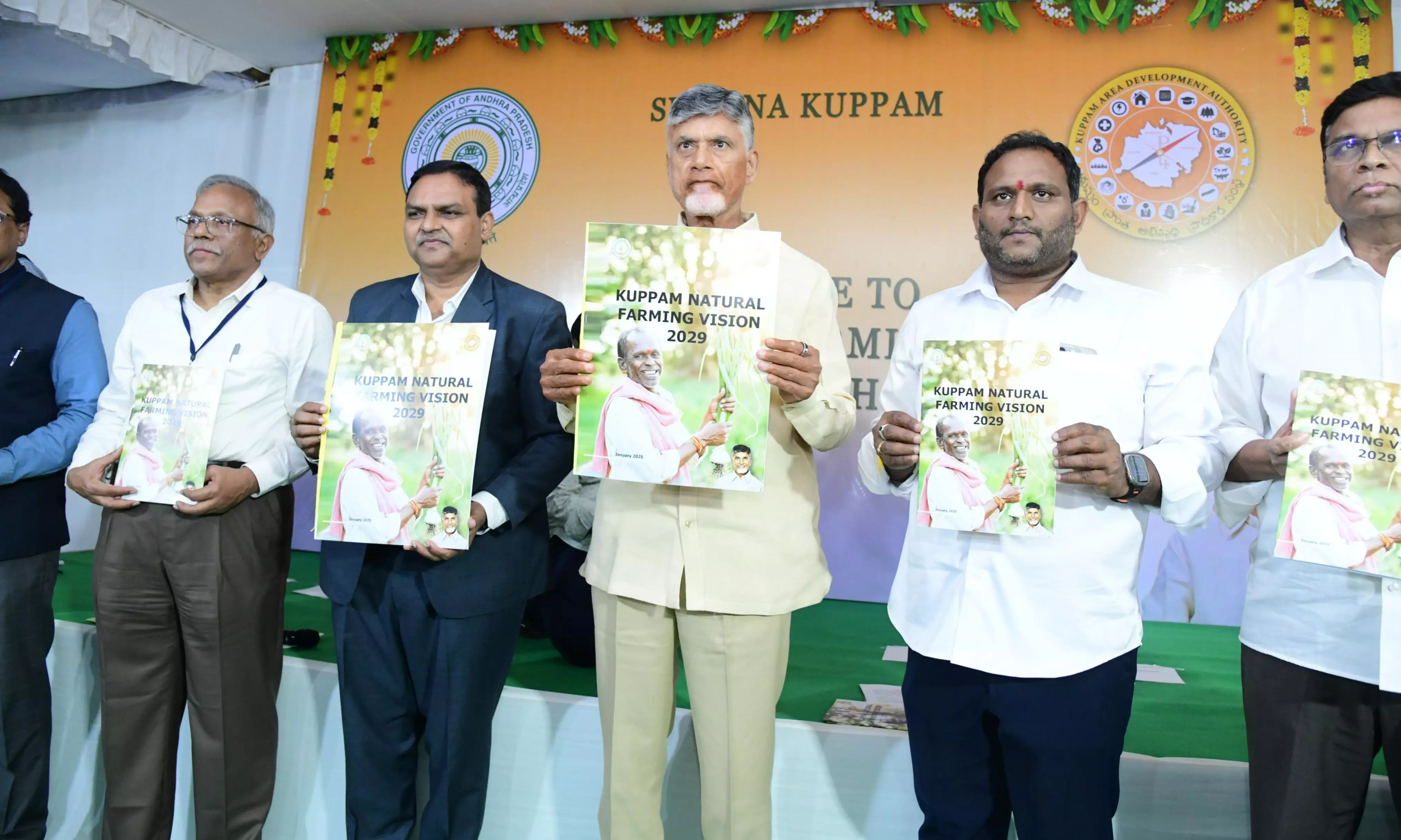Naidu Unveils Vision for Solar Power and Organic Farming in Kuppam
Tirupati: In a bid to transform Kuppam into a model constituency, Chief Minister Nara Chandrababu Naidu unveiled two ambitious initiatives on Monday: a solar power adoption drive under the PM Surya Ghar scheme and a natural farming programme under the Organic Kuppam vision. The initiatives aim to position Kuppam as a leader in renewable energy and sustainable agriculture, addressing energy needs while promoting eco-friendly farming practices. Speaking at Nadimuru village on Monday, during the inauguration of a solar power project under the Surya Ghar scheme, Naidu emphasized that Kuppam constituency would be the first beneficiary of any developmental schemes launched by the state. He highlighted his vision of sustainable progress through innovative approaches, with a focus on renewable energy and organic agriculture. Under the PM Surya Ghar scheme, every household in the Kuppam segment will be equipped with solar panels, fully subsidised by the government. Naidu underscored the scheme's importance as a milestone in achieving energy independence and environmental sustainability. “Kuppam will serve as a pilot, demonstrating how solar power can revolutionise energy consumption and production at the household level”, he said. Recollecting his childhood days, studying under lanterns due to unreliable power supply, Naidu highlighted the shift from centralised to decentralized energy generation. “Earlier, power was produced far away and transmitted to households. Today, technology enables us to generate energy at home, empowering individuals and reducing dependency on external sources”, he explained. The chief minister revealed plans to install solar panels in 20 lakh households across the state. He praised IIT Kanpur for introducing advanced technology to support this ambitious goal of 100% solarization. He also revealed that under the Surya Ghar scheme, households generating two kilowatts of power would receive a ₹60,000 subsidy, reducing the total installation cost of ₹1.10 lakh. Explaining the financial benefits, Naidu stated that households could produce 200 units of electricity per month, with 60 units used for personal consumption and the surplus 140 units supplied back to the grid, earning an estimated ₹5,000 annually. “With a subsidy of ₹60,000, the total installation cost will be reduced to ₹50,000 per household, making the initiative accessible to all”, he said. In the presence of the chief minister, an MoU was signed between the Kuppam Area Development Authority and IIT-Kanpur to achieve Net Zero carbon emissions in the region. Naidu urged citizens to adopt sustainable practices, including afforestation, to combat pollution and enhance quality of life. Later in Seegalapalle, Naidu launched the Organic Kuppam vision document under the AP Community-Managed Natural Farming (APCNF) programme. The initiative, implemented through the Rythu Sadhikara Samstha (RySS), aims to universalise natural farming practices across the Kuppam constituency. Naidu visited natural farming fields, interacted with farmers and explored stalls showcasing APCNF activities. He emphasized the importance of integrating traditional farming practices with modern research to ensure sustainable and profitable agriculture. “This initiative will improve soil health, conserve water, and provide safe, chemical-free food, while making agriculture climate-resilient,” he said. The Organic Kuppam initiative targets the transformation of 70 per cent of farmers, 50 per cent of cultivable land, and 20 per cent of fallow land to natural farming practices by 2028-29. It also aims to create 13,500 rural jobs in the next five years, scaling up to 37,000 jobs by 2034-35, with monthly incomes between `10,000 and `25,000. The programme includes reclaiming fallow land with crops like pulses and millets, promoting high-value farming models, and establishing four bio-input hubs by September 2025 to reduce chemical dependence. To enhance food diversity and health, the initiative will develop Nutri-Gardens and Nutri-Enterprises, while all Gram Panchayats will be transformed into climate-resilient villages with active local leadership. Naidu encouraged farmers to adopt technologies provided by RySS and collaborate with organisations like MARKFED for better marketing of natural farming products. “These initiatives are a blueprint for sustainable growth, setting an example for energy efficiency and eco-friendly agriculture”, he concluded, calling for collective efforts to achieve these goals.


Tirupati: In a bid to transform Kuppam into a model constituency, Chief Minister Nara Chandrababu Naidu unveiled two ambitious initiatives on Monday: a solar power adoption drive under the PM Surya Ghar scheme and a natural farming programme under the Organic Kuppam vision.
The initiatives aim to position Kuppam as a leader in renewable energy and sustainable agriculture, addressing energy needs while promoting eco-friendly farming practices.
Speaking at Nadimuru village on Monday, during the inauguration of a solar power project under the Surya Ghar scheme, Naidu emphasized that Kuppam constituency would be the first beneficiary of any developmental schemes launched by the state.
He highlighted his vision of sustainable progress through innovative approaches, with a focus on renewable energy and organic agriculture.
Under the PM Surya Ghar scheme, every household in the Kuppam segment will be equipped with solar panels, fully subsidised by the government. Naidu underscored the scheme's importance as a milestone in achieving energy independence and environmental sustainability.
“Kuppam will serve as a pilot, demonstrating how solar power can revolutionise energy consumption and production at the household level”, he said.
Recollecting his childhood days, studying under lanterns due to unreliable power supply, Naidu highlighted the shift from centralised to decentralized energy generation. “Earlier, power was produced far away and transmitted to households. Today, technology enables us to generate energy at home, empowering individuals and reducing dependency on external sources”, he explained.
The chief minister revealed plans to install solar panels in 20 lakh households across the state. He praised IIT Kanpur for introducing advanced technology to support this ambitious goal of 100% solarization. He also revealed that under the Surya Ghar scheme, households generating two kilowatts of power would receive a ₹60,000 subsidy, reducing the total installation cost of ₹1.10 lakh.
Explaining the financial benefits, Naidu stated that households could produce 200 units of electricity per month, with 60 units used for personal consumption and the surplus 140 units supplied back to the grid, earning an estimated ₹5,000 annually.
“With a subsidy of ₹60,000, the total installation cost will be reduced to ₹50,000 per household, making the initiative accessible to all”, he said.
In the presence of the chief minister, an MoU was signed between the Kuppam Area Development Authority and IIT-Kanpur to achieve Net Zero carbon emissions in the region. Naidu urged citizens to adopt sustainable practices, including afforestation, to combat pollution and enhance quality of life.
Later in Seegalapalle, Naidu launched the Organic Kuppam vision document under the AP Community-Managed Natural Farming (APCNF) programme. The initiative, implemented through the Rythu Sadhikara Samstha (RySS), aims to universalise natural farming practices across the Kuppam constituency.
Naidu visited natural farming fields, interacted with farmers and explored stalls showcasing APCNF activities.
He emphasized the importance of integrating traditional farming practices with modern research to ensure sustainable and profitable agriculture. “This initiative will improve soil health, conserve water, and provide safe, chemical-free food, while making agriculture climate-resilient,” he said.
The Organic Kuppam initiative targets the transformation of 70 per cent of farmers, 50 per cent of cultivable land, and 20 per cent of fallow land to natural farming practices by 2028-29. It also aims to create 13,500 rural jobs in the next five years, scaling up to 37,000 jobs by 2034-35, with monthly incomes between `10,000 and `25,000.
The programme includes reclaiming fallow land with crops like pulses and millets, promoting high-value farming models, and establishing four bio-input hubs by September 2025 to reduce chemical dependence.
To enhance food diversity and health, the initiative will develop Nutri-Gardens and Nutri-Enterprises, while all Gram Panchayats will be transformed into climate-resilient villages with active local leadership.
Naidu encouraged farmers to adopt technologies provided by RySS and collaborate with organisations like MARKFED for better marketing of natural farming products. “These initiatives are a blueprint for sustainable growth, setting an example for energy efficiency and eco-friendly agriculture”, he concluded, calling for collective efforts to achieve these goals.






































